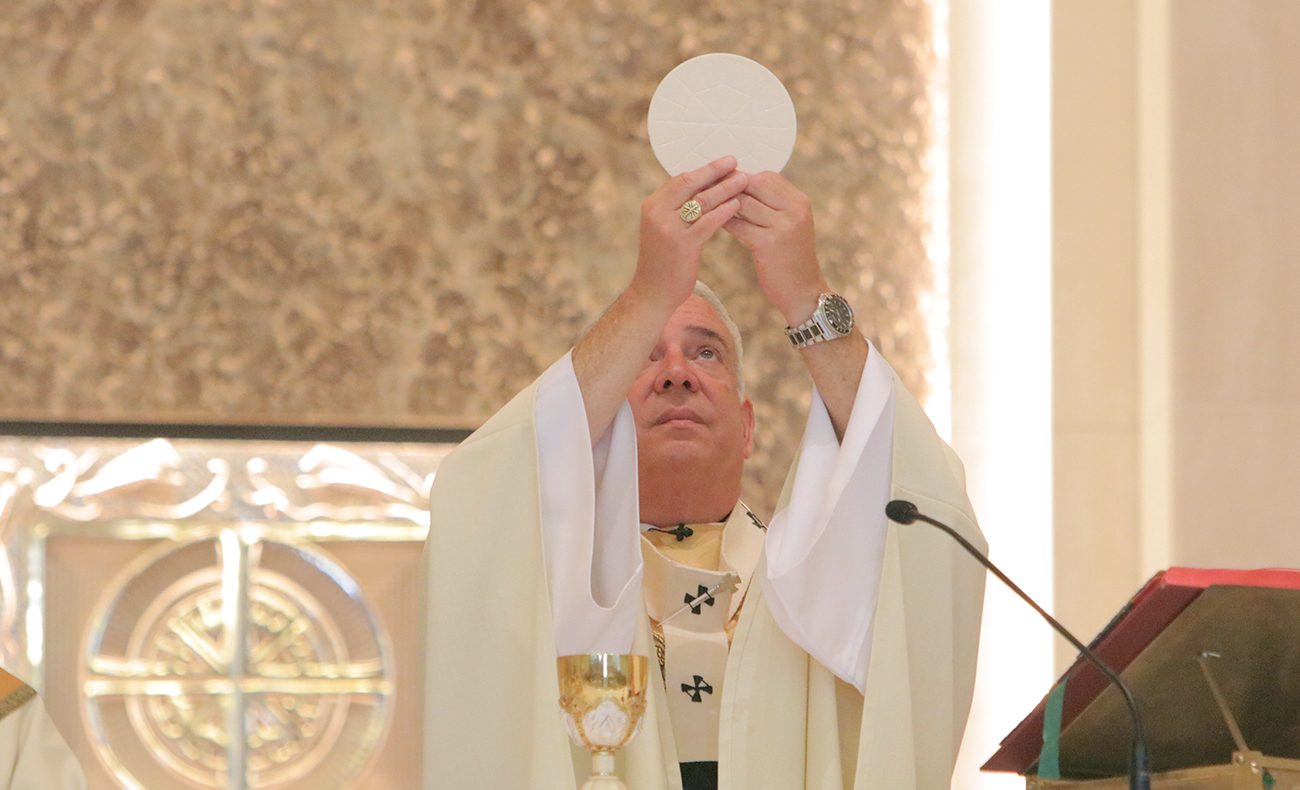The gift of the Eucharist, “the source and summit of the Christian life” as the Second Vatican Council teaches, is “a gift that we shouldn’t take for granted,” said Father Joseph Shenosky, the pastor of Mary, Mother of the Redeemer Parish in North Wales and archdiocesan coordinator of the National Eucharistic Revival.
“Our faith in Christ, truly present in the Eucharist, is not something that we should just hold inside of us. That we can publicly manifest to this faith is really a beautiful, beautiful gift.”
He recently discussed how the final, locally centered months of the three-year revival effort of the Catholic Church in the United States aim to sharpen Catholics’ awareness of the intimate encounter with Christ in the sacrament, and sharing that experience with everyone.
“The bishops really want to light a fire. They want to set us on fire with faith,” he said. “The call is to go out on mission and to share this love of God made known to us in Jesus in the Eucharist, to share this love with others, especially in service to those most in need.”
This year of mission, culminating in June, is the final series of steps in a journey started locally by a year of focus at the diocesan level. It shifted to a year of parish-centered efforts.
“Having times of adoration, having prayer groups to reflect on the Scriptures and the importance of the Eucharist in our daily lives,” said Shenosky. “We’ve been promoting the celebration of 40 Hours devotions brought to the Archdiocese by Bishop St. John Neumann in the 19th century … as a way to set time out of our busy lives, to set these three days in which in every parish, school, community (and) institution in the Archdiocese (can) have this time of adoration of the Lord.”
The third and final year, one defined by the word “mission,” launched from a springtime eucharistic pilgrimage across the U.S., with one course wending through the Philadelphia region ending with the National Eucharistic Congress in an Indianapolis stadium on Corpus Christi weekend last June.
>>> SEE RELATED: Pilgrims to Eucharistic Congress Come Home Ready to Go ‘Out on Mission’
“I had never participated in adoration of the Blessed Sacrament with 50,000 people in a stadium, and it was just remarkable,” said Father Shenosky. “You could hear a pin drop.”
Such close intimacy now leads to the final stage, “going out on mission,” as Father Shenosky describes it.
The U.S. Bishops’ Conference and the National Eucharistic Revival Committee have developed a year of mission playbook for parishes featuring practical ideas for implementing the year of mission in parishes, schools and institutions.
A major part of that playbook involves “Walk With One,” a deeply personal way of evangelizing, according to Father Shenosky.
One should be “very intentional of praying for someone that we know and love, a family member, a friend who has stopped going to Mass, stop practicing their faith, to pray for them that the Lord touch their hearts and bring them back to the Lord and to the active practice of their Catholic faith,” Father Shenosky said. “God can work miracles … pray and not to underestimate that our prayers can really move mountains.
“Pray that there be a circumstance, a window that God will open, that we can invite someone. Maybe it’s as simple as, ‘I’m going to Mass. Would you like to join me?’ To look for an opportunity that God will provide. Look for an opening to invite.”
Finally, Father Shenosky suggests connecting our faith to the everyday, evangelizing through loving, joy-filled action that will bring curiosity by others and invite us to share our love of the risen Christ.
“Joyfully witnessing to our vocation in life, by joyfully living our faith — that’s more important than words,” said Father Shenosky. “I think often we attract more with a teaspoon of honey than a gallon of vinegar. If people see that we joyfully live our faith, that we love people, that we serve people in need … that’s the most important testament that we can give, more than words. Actions: How do we live our life?”
That one-on-one intimacy can embody the Communion that connects the fragility of the Eucharist with the Christian love we’re called to share.
Christ “doesn’t come to us with overwhelming power or with force, but with the humility of God in the Eucharist,” Father Shenosky said. “(In) that way people can have a sense that God is infinitely approachable. In Christ, present in the Eucharist, we see the humility of God, the vulnerability of God, who makes himself this way so that we don’t have to be afraid to come to him.”
PREVIOUS: City Archdiocesan High Schools to Utilize Flexible Instruction Day, Parochial Elementary Schools to Close Jan. 6
NEXT: Holy Hours of Prayer Mark January Campaign for Priestly Vocations in Region



Share this story